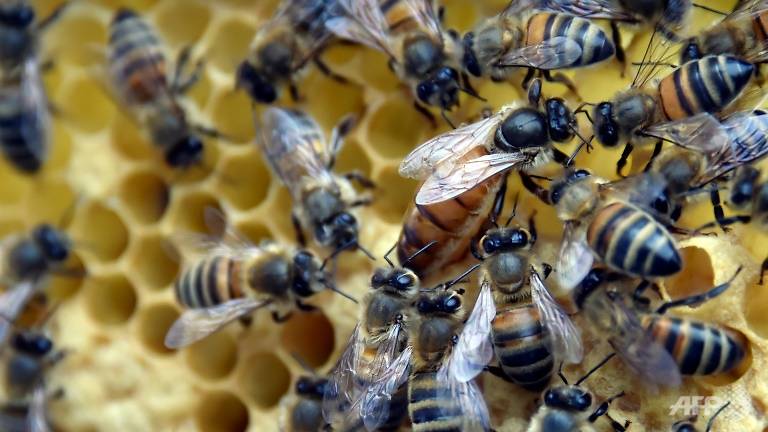Australia stung by New Zealand bid to trademark manuka honey
 |
| New Zealanders want to secure protected status for honey labelled manuka, in the same way France did with Champagne and Portugal did with its Porto wine. (Photo: AFP/Georges Gobet) |
The fracas erupted when a New Zealand association applied for exclusive rights to market manuka honey in five countries, including the United States, Britain, Australia and China, incensing Australian beekeepers who have dismissed the Kiwi claims as "ridiculous".
Nicknamed "liquid gold", manuka honey is produced by bees foraging on the flowers of the tea tree shrub, which grows wild in both countries.
Devotees hail it as a wonder food, with antiseptic and anti-inflammatory properties that can cure skin conditions, heal sore throats, boost immunity and aid digestion.
Celebrity fans include Scarlett Johansson, Gwyneth Paltrow, and Kourtney Kardashian, a manuka "brand ambassador" who slathers it on her face, eats it raw and feeds her children manuka honey tea to ward off colds.
The honey's star ingredient is methylglyoxal (MGO), an antimicrobial molecule, found in higher concentrations in manuka than other honey varieties.
While scientists strongly dispute some of the health claims made on its behalf, manuka is now a staple in high-end supermarkets around the world and appears in expensive products ranging from face cream to shampoos and lip balm.
Prices soar in line with the proportion of MGO, reaching up to 300 euros for a one-kilogram jar containing 700 milligrams of the antiseptic ingredient.
FIERCELY PROTECTIVE
It has helped the value of New Zealand's honey exports triple in the five years to 2016 on soaring demand, particularly from China.
Small wonder then that New Zealand's honey producers are fiercely protective of their manuka brand and bristle at what they see as Australian attempts to piggyback off its success.
The Australians are equally adamant that their honey should be called manuka because it comes from the same plant as the Kiwi product and has similar MGO levels.
The New Zealanders want to secure protected status for honey labelled manuka, meaning only their products can carry the name.
France did it with Champagne, Portugal with its Porto wine, and Italy with Parma ham and Parmigiano Reggiano (parmesan) cheese, all to lucrative effect.
"Our initiative is not an anti-Australian thing," said John Rawcliffe, spokesman for the New Zealand association Unique Manuka Factor (UMF), whose contentious application for the trademark sparked the dispute.
"The most important thing is to protect the customers. Manuka is a Maori word and it's crucial that Manuka honey can be authenticated and related to a terroir, a climate, exactly like ... Champagne," Rawcliffe told AFP.
The absence of certification has helped counterfeiters hawk their version of manuka honey to unsuspecting consumers, Rawcliffe said, citing Portuguese producers among the offending imitators.
"Australia should be able as well to have certifications for its very good honeys ... in a global market exposed to forgeries, the certification of our products would benefit both of us," he added.
But Australian producers say New Zealand has no right to claim a monopoly on manuka honey.
'RIDICULOUS AND UNFAIR'
Lindsay Bourke, a spokesperson for the Australian Honey Bee Industry Council, described the trademark bid as "ridiculous and unfair".
"Why would they prevent other manuka honey producers to use the name manuka considering they grow exactly the same variety of plant?" Bourke told AFP.
Paul Callender of the recently established Australian Manuka Honey Association (AMHA) said Australia was home to 80 varieties of manuka honey, including one native to Tasmania but claimed by New Zealand.
Callender pointed out the manuka market is expected to continue to grow - making further inroads into "medical, pharmaceutical, cosmetics and nutritional sectors" - and urged producers in both countries to join hands and reap the benefits.
"We have cheaper price acquisition and operating costs than the Kiwis. But they are very good in marketing. So why not become partners instead of fighting?"
New Zealand producers launched their bid for protected status in 2015, applying to authorities in their five largest markets.
It is expected to be a long process, with their Australian rivals lodging objections every step of the way and warning that a result in the Kiwis' favour would have dire implications for honey lovers.
"If they managed to get the certification then our losses would be huge," Bourke said.
"Fortunately it's not going to happen: first because this request is based on a lie and then because it would mean a surge of manuka honey prices for consumers."
What the stars mean:
★ Poor ★ ★ Promising ★★★ Good ★★★★ Very good ★★★★★ Exceptional
Latest News
More News
- Foreign leaders extend congratulations to Party General Secretary To Lam (January 25, 2026 | 10:01)
- Russian President congratulates Vietnamese Party leader during phone talks (January 25, 2026 | 09:58)
- Worldwide congratulations underscore confidence in Vietnam’s 14th Party Congress (January 23, 2026 | 09:02)
- Political parties, organisations, int’l friends send congratulations to 14th National Party Congress (January 22, 2026 | 09:33)
- 14th National Party Congress: Japanese media highlight Vietnam’s growth targets (January 21, 2026 | 09:46)
- 14th National Party Congress: Driving force for Vietnam to continue renewal, innovation, breakthroughs (January 21, 2026 | 09:42)
- Vietnam remains spiritual support for progressive forces: Colombian party leader (January 21, 2026 | 08:00)
- Int'l media provides large coverage of 14th National Party Congress's first working day (January 20, 2026 | 09:09)
- Vietnamese firms win top honours at ASEAN Digital Awards (January 16, 2026 | 16:45)
- ASEAN Digital Ministers' Meeting opens in Hanoi (January 15, 2026 | 15:33)
















 Mobile Version
Mobile Version